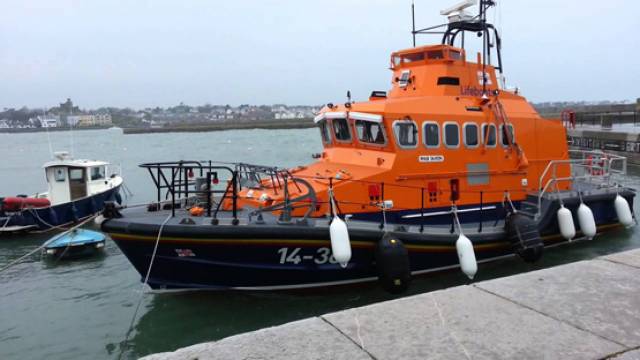Donaghadee RNLI’s volunteer lifeboat crew put to sea on Wednesday night (3 July) to rescue three adults and two children who had become stranded on the Copeland Islands following problems with their jetski.
The group had gone to the Co Down islands while the sun was still out but were stranded in the early evening when their jetski began to have mechanical issues.
They used a mobile phone to try and contact both Donaghadee and Bangor lifeboat stations before contacting a crew member on their mobile phone.
Paged at 7pm, the volunteers and made good speed in calm conditions in the RNLI Trent class lifeboat Saxon to Chapel Bay on the Big Copeland Island.
The lifeboat’s smaller XP boat, an inflatable tender carried by Saxon, was launched to go to the shore and bring the casualties to the warmth and safety of the larger lifeboat.
A towline was secured by the volunteer crew and the lifeboat returned to Donaghadee Harbour where the casualties were passed to the care of the coastguard.
Speaking following the callout, Donaghadee RNLI coxswain Philip McNamara said: “I feel we got to the casualties just on time, they were starting to feel the cold after spending quite sometime in the sunshine. They didn’t have any water to hydrate or clothing to keep them warm.”
In other news, Donaghadee’s crew joined tributes to an American couple with strong Northern Ireland roots for a generous $74,000 donation which will help the RNLI to continue saving lives at sea.
The late John Bradley, who grew up and worked in Co Tyrone, and his wife Sally Sue, who he met as a pen pal, donated $37,000 each to Bangor and Donaghadee lifeboat stations, while Tower Lifeboat Station, based next to Waterloo bridge in East London received $5,000.
John, who died on 1 July aged 81, leaves a lasting legacy to the RNLI, with the Bradleys’ donation to be used for vital volunteer crew kit and training.
Peter Irwin, Donaghadee RNLI lifeboat operations manager, said: “We are so grateful and would like to sincerely thank Sally Sue and John, and remember John for his amazing support of the RNLI. We are saddened to hear of John’s death and extend our sympathies to Sally Sue and the Bradley family.”































































